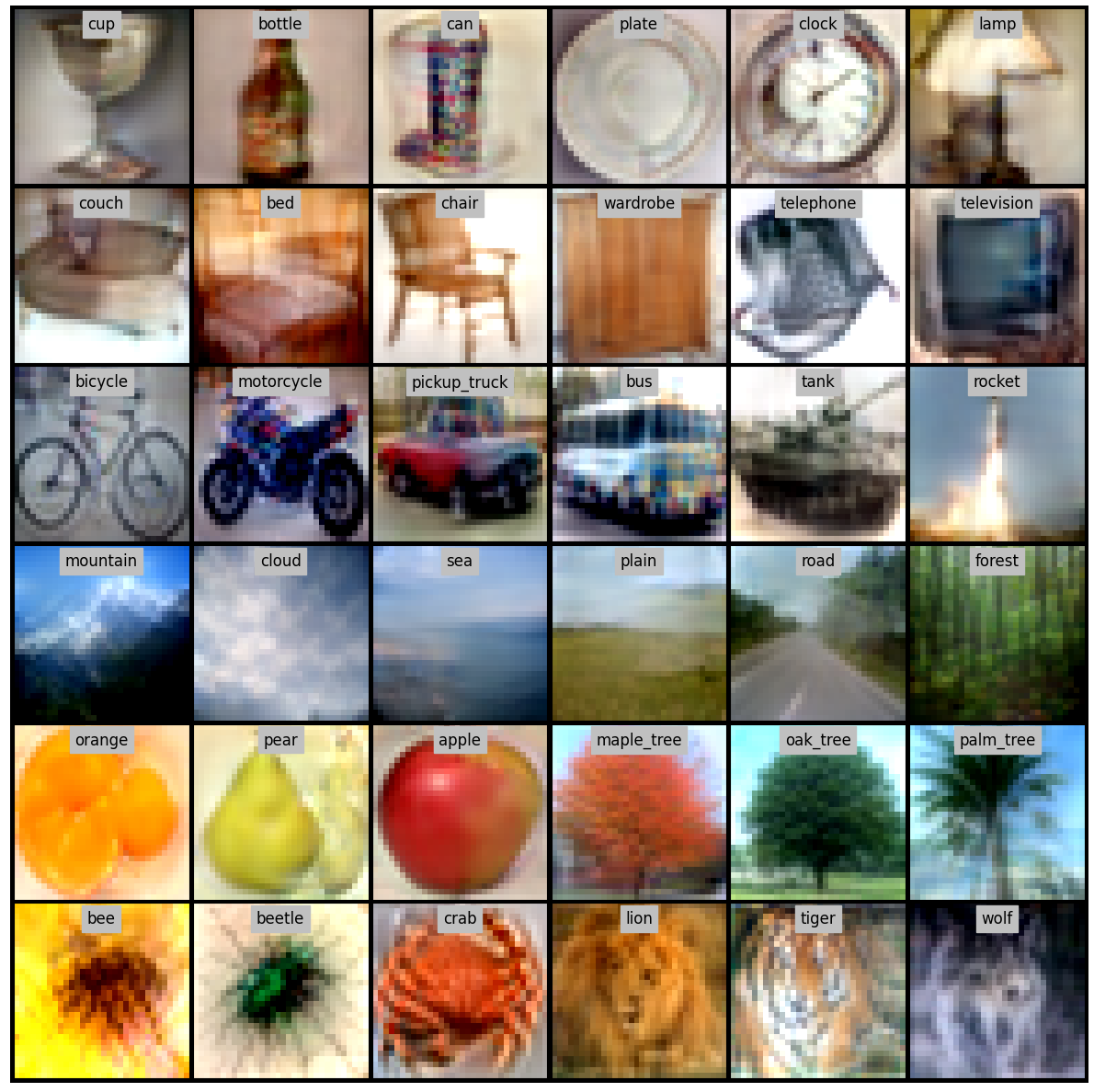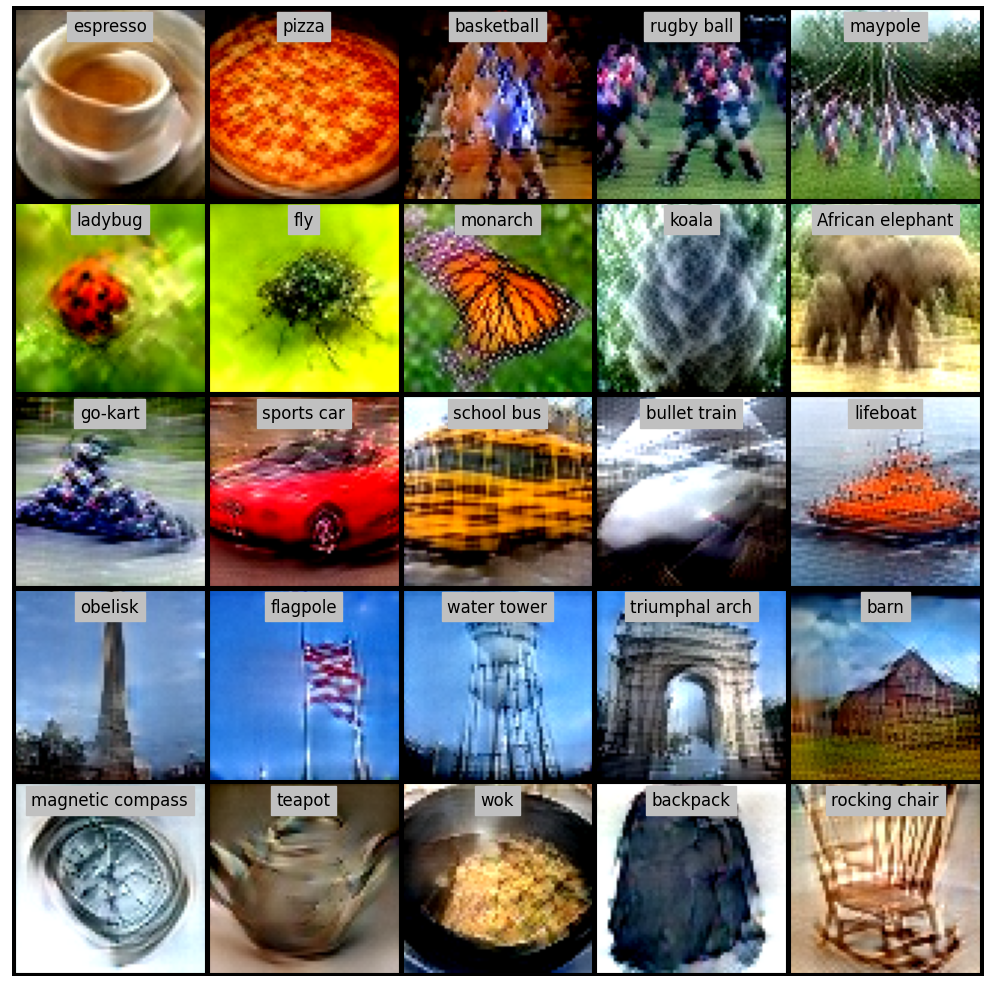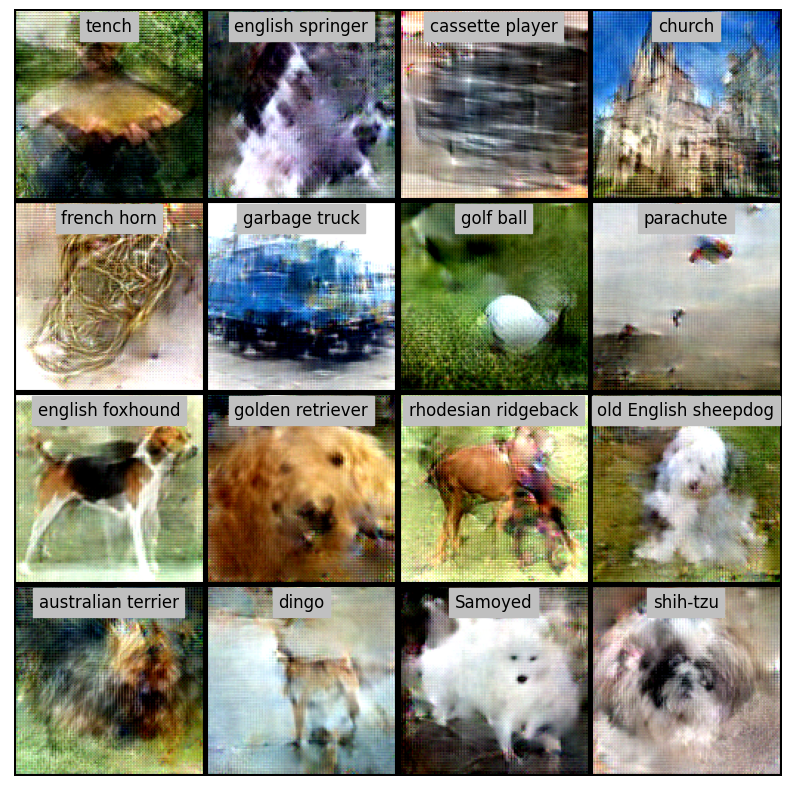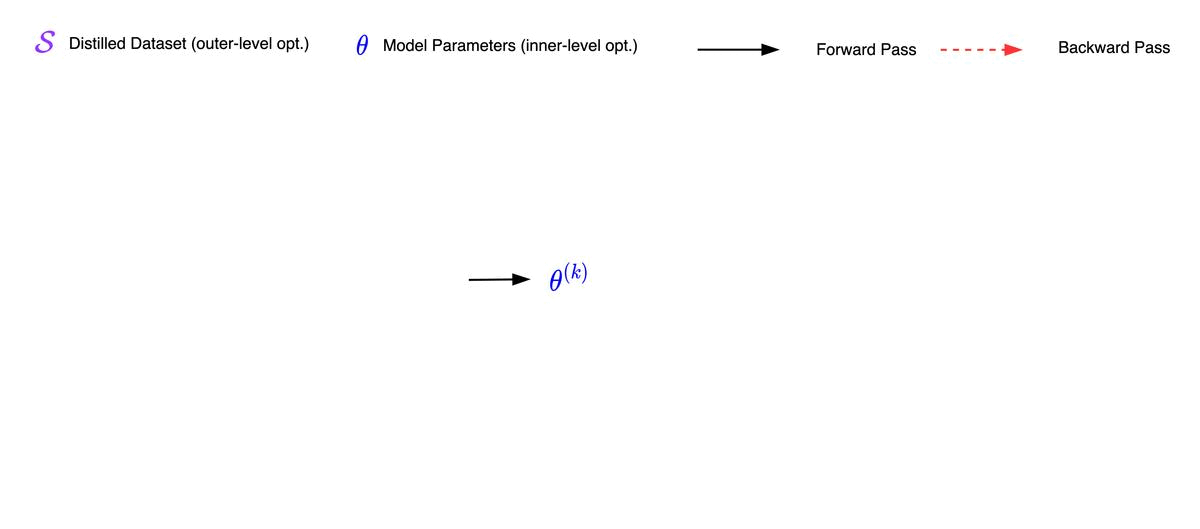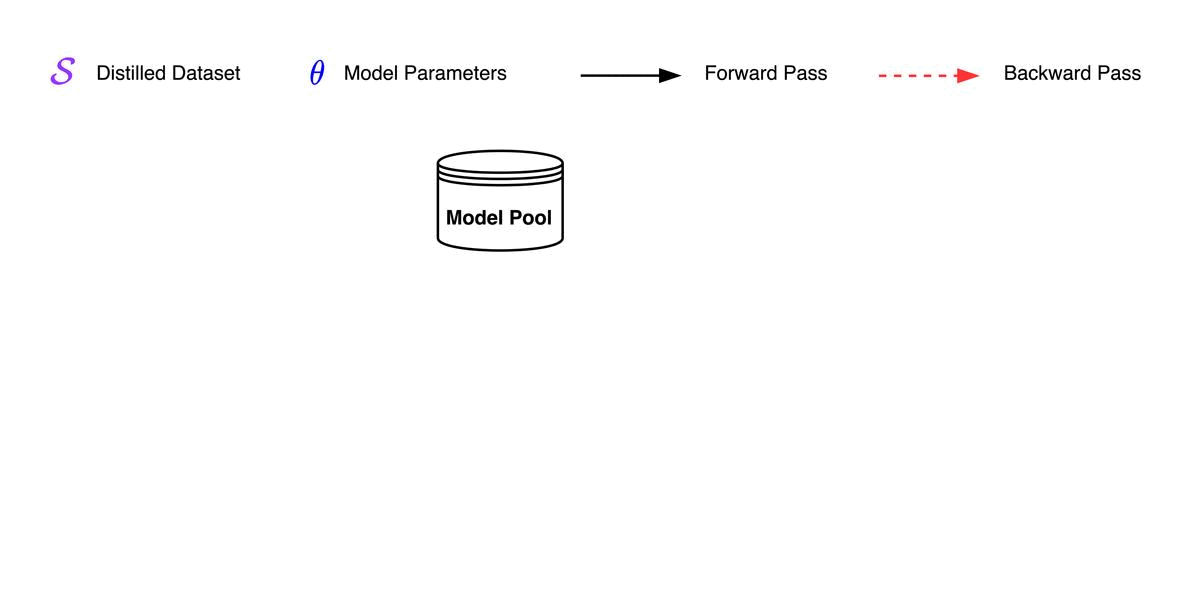Project Page | OpenReview | ArXiv | Video | Slides
This repo contains code for training distilled dataset using neural feature regression (NeurIPS 2022). Please see our paper and project page for more results.
Dataset distillation aims to learn a small synthetic dataset that preserves most of the information from the original dataset. Dataset distillation can be formulated as a bi-level meta-learning problem where the outer loop optimizes the meta-dataset and the inner loop trains a model on the distilled data. Meta-gradient computation is one of the key challenges in this formulation, as differentiating through the inner loop learning procedure introduces significant computation and memory costs. In this paper, we address these challenges using neural Feature Regression with Pooling ( FRePo), achieving the state-of-the-art performance with an order of magnitude less memory requirement and two orders of magnitude faster training than previous methods. The proposed algorithm is analogous to truncated backpropagation through time with a pool of models to alleviate various types of overfitting in dataset distillation. FRePo significantly outperforms the previous methods on CIFAR100, Tiny ImageNet, and ImageNet-1K. Furthermore, we show that high-quality distilled data can greatly improve various downstream applications, such as continual learning and membership inference defense.
To compute the meta gradient efficiently, FRePo only trains the last layer of a neural network to convergence while keeping the feature extractor fixed. In this case, computing the prediction on the real data using the model trained on the distilled data can be expressed as a kernel ridge regression and computing the meta-gradient is simply back-propagating through the kernel and a fixed feature extractor. As shown in the animation, FRePo is analogous to 1-step TBPTT as it computes the meta-gradient at each step while performing the online model update. However, instead of backpropagating through the inner optimization, FRePo computes the meta-gradient through a kernel and feature extractor.
To alleviate overfitting, FRePo maintains a diverse pool of models instead of periodically training and resetting a single model. From the meta-learning perspective, we maintain a diverse set of meta-tasks to sample from and avoid sampling very similar tasks at each consecutive gradient computation to avoid overfitting to a particular setup.
- You can set up the environment using the command below.
conda env create -f environment.yaml
conda activate frepo
# Configure Environment Variable (Change to your own path)
export LD_LIBRARY_PATH=/scratch/ssd001/pkgs/cuda-11.3/lib64:/scratch/ssd001/pkgs/cudnn-11.4-v8.2.4.15/lib64:$LD_LIBRARY_PATH
export XLA_FLAGS=--xla_gpu_cuda_data_dir=/scratch/ssd001/pkgs/cuda-11.3
export PATH=/scratch/ssd001/pkgs/cuda-11.3/bin:$PATH- You can train and evaluate the distilled data using the following command.
path="--dataset_name=cifar100 --train_log=train_log --train_img=train_img --zca_path=data/zca --data_path=~/tensorflow_datasets --save_image=True"
exp="--learn_label=True --random_seed=0"
arch="--arch=conv --width=128 --depth=3 --normalization=batch"
hyper="--max_online_updates=100 --num_nn_state=10 --num_train_steps=500000"
ckpt="--ckpt_dir=train_log/cifar100/step500K_num100/conv_w128_d3_batch_llTrue/state10_reset100 --ckpt_name=best_ckpt --res_dir=dd/cifar100 --num_eval=5"
python -m script.distill $path $exp $arch $hyper --num_prototypes_per_class=1
python -m script.eval $ckpt $path $arch- Parameter Description
- dataset_name: choice: ['cifar10', 'cifar100', 'mnist', 'fashion_mnist', 'tiny_imagenet', 'imagenet_resized/64x64, 'imagenette', 'imagewoof', 'caltech_birds2011']
- data_path: path to dataset
- zca_path: path to zca transformation matrix
- train_log: directory holding tensorboard outputs and checkpoints
- train_img: directory holding sampled distilled images
- ckpt_dir: checkpoint directory
- ckpt_name: checkpoint to evaluate. Choice: ['best_ckpt', 'proto', 'saved_ckpt']
- res_dir: evaluation result output directory
Checkpoints (Link)
- You can download checkpoints to a new directory
ckpts_driveand then run the following command.
path="--dataset_name=cifar100 --zca_path=data/zca --data_path=~/tensorflow_datasets"
arch="--arch=conv --width=128 --depth=3 --normalization=batch"
ckpt="--ckpt_dir=ckpts_drive/cifar100/ipc1_llTrue --res_dir=ckpts_drive/cifar100 --num_eval=5"
python -m script.eval $ckpt $path $arch- Parameter Description
- ckpt_dir: checkpoint directory
- res_dir: evaluation result output directory
- eval_batch_size: batch_size for evaluation
- num_eval: number of random models to evaluate
- You can load the checkpoint using the following code snippet.
- Note: we use ZCA preprocessing for all datasets except for MNIST and FashionMNIST. Thus, when load the distilled data to other frameworks, make sure the same data preprocessing is applied to the test data.
from flax.training import checkpoints
ckpt_path = "PATH/TO/CHECKPOINT"
state = checkpoints.restore_checkpoint(ckpt_path, None)
images, labels = state['params']['x_proto'], state['params']['y_proto']path="--dataset_name=cifar100 --train_log=train_log/cl --train_img=train_img/cl --zca_path=data/zca --data_path=~/tensorflow_datasets --save_image=False"
exp="--learn_label=True --num_prototypes_per_class=20"
arch="--arch=conv --width=128 --depth=3 --normalization=batch"
hyper="--max_online_updates=100 --num_nn_state=10 --num_train_steps=500000"
ckpt="--ckpt_dir=train_log/cl/cifar100 --ckpt_name=best_ckpt --res_dir=cl/cifar100 --num_eval=5 --num_online_eval_updates=10000"
cl_steps=5
for seed in {0..4}
do
for ((idx=0; idx<$cl_steps; idx++))
do
python -m script.distill_cl $path $exp $arch $hyper --cl_steps=$cl_steps --cl_step_idx=$idx --cl_seed=$seed
done
done
for seed in {0..4}
do
for ((idx=0; idx<$cl_steps; idx++))
do
python -m script.eval_cl $ckpt $path $arch --use_cl=True --cl_steps=$cl_steps --cl_step_idx=$idx --cl_seed=$seed
done
donepath="--train_log=train_log/mia --train_img=train_img/mia --zca_path=data/zca --data_path=~/tensorflow_datasets --save_image=False"
exp="--dataset_name=mnist --num_prototypes_per_class=50 --learn_label=True --random_seed=0 --res_dir=mia/mnist/summary"
arch="--arch=conv --width=128 --depth=3 --normalization=batch"
hyper="--max_online_updates=100 --num_nn_state=10 --num_train_steps=500000"
chunk_num=5
chunk_size=10000
for ((idx=0; idx<$chunk_num; idx++))
do
python -m script.mia $path $exp $arch $hyper --chunk_size=$chunk_size --chunk_idx=$idx
done@inproceedings{zhou2022dataset,
title={Dataset Distillation using Neural Feature Regression},
author={Zhou, Yongchao and Nezhadarya, Ehsan and Ba, Jimmy},
booktitle={Proceedings of the Advances in Neural Information Processing Systems (NeurIPS)},
year={2022}
}
